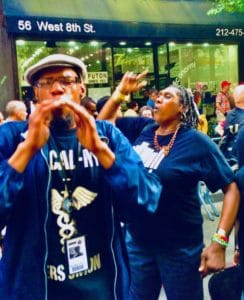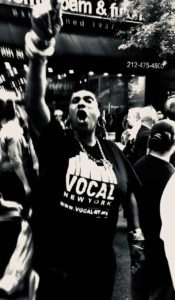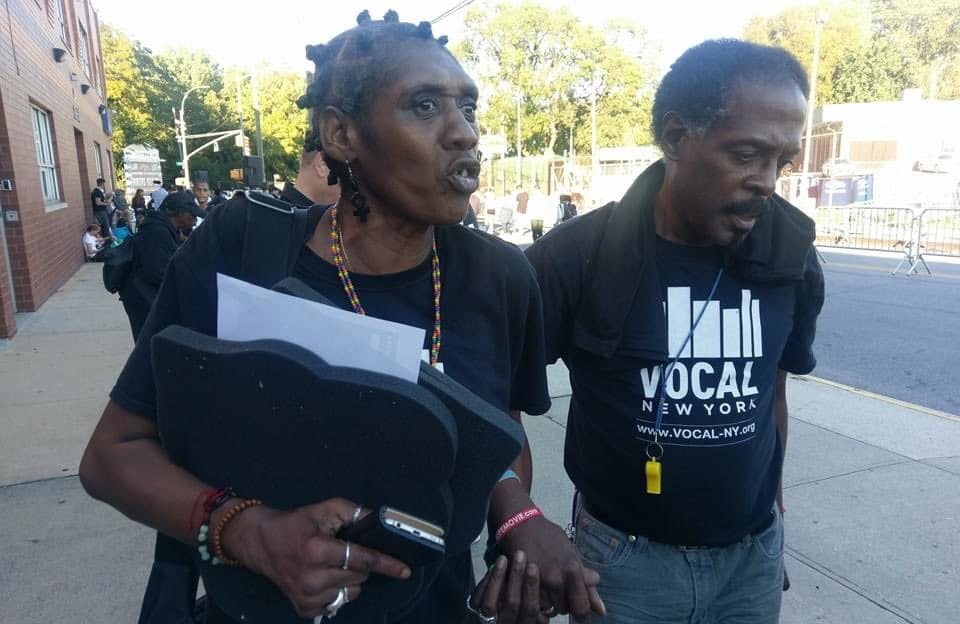A powerhouse activist organizing for people living with HIV, drug users and unhoused New Yorkers has died, it was announced on September 19. She leaves a legacy of Black queer woman leadership for New York City’s harm reduction movement.
Elizabeth Owens, a 60-year-old Bronx resident, brought her own experiences with heroin use and homelessness to her years of community organizing. After she stopped using heroin, she volunteered with Harlem’s New York Harm Reduction Educators (NYHRE), conducting outreach to other people who use drugs.
“I got tired of seeing them walking around with scabs, or spots, on their limbs,” she told Hep magazine in 2014. “I cared about their health and talked to them so they’d know there were places to get care.”
While at NYHRE, she connected with organizers from VOCAL-NY, a Black-led grassroots organization providing services like syringe exchange, and advocating for the end of the war on drug users, homelessness, mass incarceration and HIV/AIDS. Her interest in joining VOCAL as an outreach worker in 2010, according to her Hep feature, stemmed from her desire to improve the health and wellness of others who were living with hepatitis C, as she was. She soon started a support group for women with hep C.
Eventually joining VOCAL-NY as an organizer, she grew the organization’s base, person-by-person, door-by-door. “She was never afraid to be on the front lines of a protest & spent hrs knocking doors across the city to recruit & inspire ppl to join our fight,” tweeted VOCAL-NY. The organization intends to commemorate her life at its annual gala on September 30, in part by inaugurating the Elizabeth Owens Award for Justice, Compassion and Love.
Her personable face-to-face outreach is what, in 2013, activated Jawanza Williams—then a 23-year-old staying in a shelter for people living with HIV, and now VOCAL-NY’s director of organizing. “It was at the height of the BLM movement. I was becoming hyper-politicized. I was realizing I wasn’t experiencing homelessness because of me, but because of these structural things, like racism. That day, I was experiencing all this agitation. Then I heard these three knocks on my door and it was Elizabeth.”
“I was floating for meaning and she snatched me from the stasis.”
Elizabeth started She’s So VOCAL, a women’s organizing group within VOCAL. “She created a beautiful, affirming space for women in our organization to come together to strategize on campaigns, and to lift each other up,” wrote VOCAL. Williams added, “At VOCAL-NY, we’re dealing with challenging the world, and challenging ourselves. She’s So VOCAL was recognizing that women leaders needed a safer space, by and for them. I was never in that space, but it really was an important way to make sure there were women prepared to lead those campaigns.”
Interview with Elizabeth Owens of VOCAL-NY for the film “Reach for Me: Fighting to End America’s Drug Overdose Epidemic”
For Elizabeth, building power within her communities was everything. “My payment [for my organizing work] is when somebody comes up and hugs me and says, ‘Yo, I didn’t know that I could go up there and sit in a congressman’s office or an assemblyman’s office and they’d listen to me tell them what’s going on in the neighborhood’,” she told Hep.
“If you’ve met Elizabeth you’ll remember her. She greeted you with a loud “thank you for coming to work today!” & gave you a big hug, never a handshake. She talked to everyone on the street or the subway, breaking the monotony of a commute to work w her infectious smile & laugh,” wrote VOCAL-NY.
I am truly shocked still that our beloved Elizabeth Owens is gone. She truly was the heart and soul of @VOCALNewYork.
Rest in power love. pic.twitter.com/icbHESTyDe
— Jawanza James Williams 🌹 (@Jawanza) September 21, 2020
Elizabeth’s fighting spirit was captured in a video posted by Williams shortly after her death.
“It’s time for us to build a movement. It’s time for us to scare the mess out of these people that sit up there and promise to do for us. If we don’t say nothin’, we’re okayin’ what they’re doing,” she proclaimed. “This is our world. We helped build this community. How dare we sit up there and let someone say, ‘We’re taking it back from you.’ It’s time to stand up and fight. Can I get an amen on that?”


Top photograph of Elizabeth Owens courtesy of Jawanza Williams. Additional photographs by Helen Redmond.





Show Comments